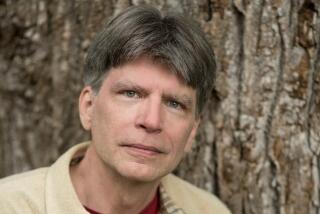Here, there’s no such thing as an ordinary life
THE world is not as it seems.
Each of us, in his or her own particular way, believes that. If we didn’t, our lives would be intolerable. We turn to religion, to existentialism, to various doomed commitments and enthusiasms, to alcohol or drugs, to the pursuit of wealth, the Internet, psychiatry, magic. Looking for more.
Orson Scott Card’s “Magic Street” is about more, and about loss. “The toadstools grow where the fairies dance,” a central character remarks in this novel concerning what Card characterizes as “the leakage of magic into the world.” It boasts what has to be one of the oddest, most unsettling first chapters this side of Chester Himes’ “Blind Man With a Pistol”:
“Byron got the kit open and took out the scissors and then found himself hesitating as he tried to decide what color thread to use. Until he finally realized that the color didn’t matter. It was insane to even worry about it. Except what was sane about any of this? A woman who wasn’t pregnant this morning, she gives birth before dinner?
“He tied the umbilical cord and then tied it again, and between the two threads he cut the springy flesh. It was like cutting raw turkey skin.
“Only when he was done did he realize what was wrong. The baby hadn’t made a sound.”
To L.A.’s upwardly mobile African American community of Baldwin Hills comes a bag man who mysteriously charms everyone he meets. An equally mysterious woman in black on a motorcycle also arrives. Bag Man may be responsible for the miraculous birth that Byron attends in the first chapter. And Motorcycle Mama seems to be after the baby.
The pair, we learn in due time, are Titania and Puck, slipped out the back door of fairyland to pay our world a visit. They are part of the magic that has leaked over into the lives of Byron Williams, his son Word, Ura Lee Smitcher, her neighbor Ceese and the other residents of Baldwin Hills.
“Magic Street’s” publisher hails it as “the long-awaited contemporary fantasy novel from the bestselling author of ‘Ender’s Game.’ ” It’s a great read, Card’s take on his characters as sure as ever, his narrative rock solid, his dialogue crackling and authentic.
“Magic Street” and “Ender’s Game” underscore how closely fantastic fiction approaches myth. Myth allows us to imagine our lives into meaning something more: Myth simplifies the clutter of daily existence and, in linking our lives to something far larger, aggrandizes us.
“So Long Been Dreaming” is an anthology of original stories that, as co-editor Nalo Hopkinson relates in her introduction, “take the meme of colonizing the natives and, from the experience of the colonizee, critique it, pervert it ... with irony, with anger, with humour, and also, with love and respect for the genre of science fiction that makes it possible to think about new ways of doing things.”
Fantastic fiction offers, as does no other story form, the possibility of truly seeing things aslant, of seeing them made marvelous, seeing them anew. Here is the beginning of Karin Lowachee’s “The Forgotten Ones”:
“In the twilight, my brother Hava’s eyes glow red. Before the old women of Rumi village were washed from this life, they said it was the spirit of blood in him, my twin. I do not have such spirit. I am the silent breath, the old women said, she who walks behind the blood and is last in the sand before death. Death is the final hand that smooths your tracks beneath the waves. And before death there is the silent breath, and before the silent breath there is the blood. And my brother’s eyes glow red with it.”
Virtually every story here is a stunner, marvelous in every sense of the word. And each of them is in its own way a new folk tale, a new myth.
“If we do not imagine our futures,” co-editor Uppinder Mehan writes in his afterword, “postcolonial peoples risk being condemned to be spoken about and for again.... So many of us have written insightfully about our pasts and presents; perhaps the time is ripe for us to begin creatively addressing our futures.”
More to Read
Sign up for our Book Club newsletter
Get the latest news, events and more from the Los Angeles Times Book Club, and help us get L.A. reading and talking.
You may occasionally receive promotional content from the Los Angeles Times.









